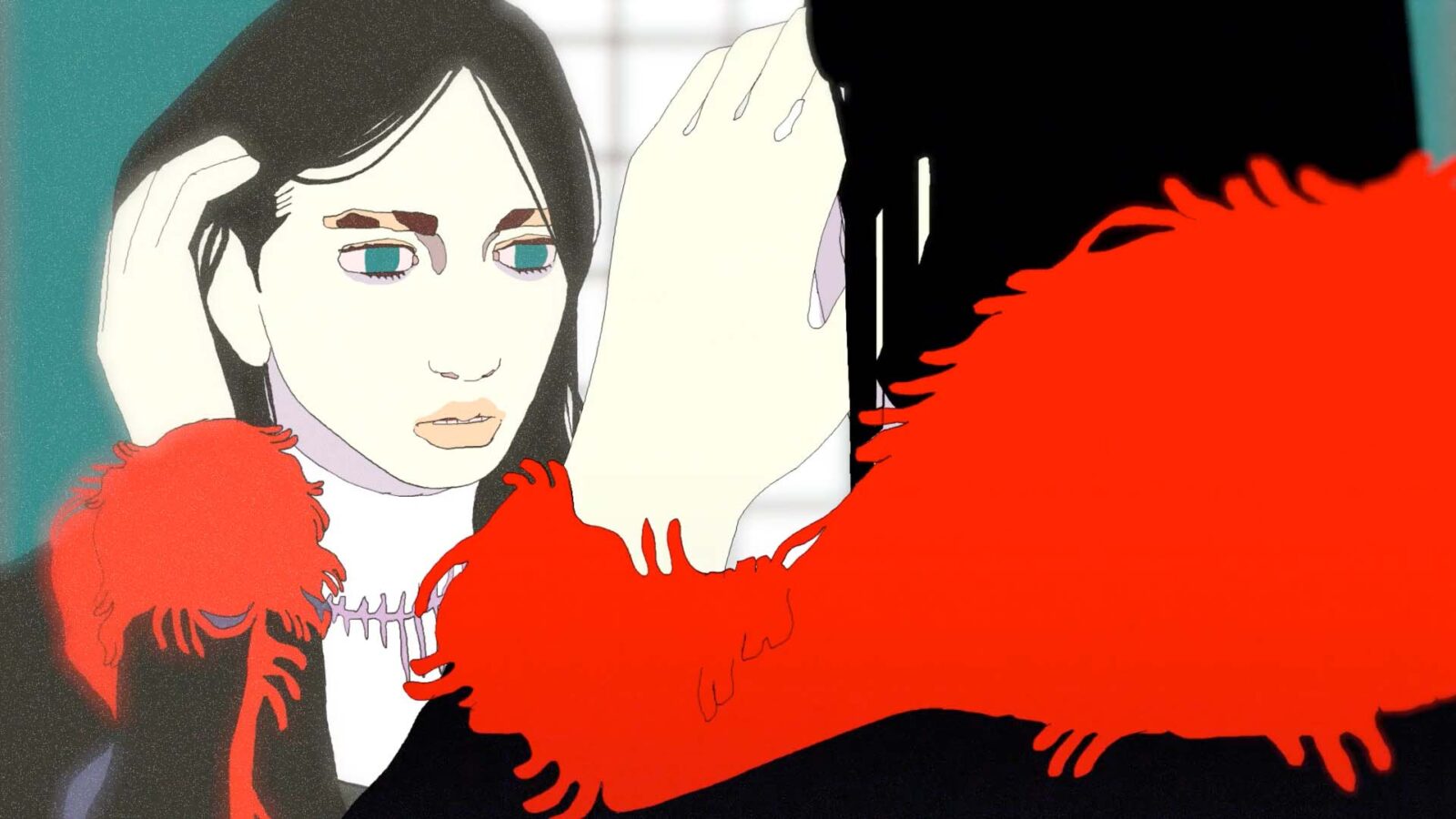You Are Being Watched
A Kind of Testament
In his short film debut, Stephen Vuillemin explores parasocial relationships, highlighting the pervasive feeling of surveillance that has become increasingly prevalent in our digital age.

We had joy, we had fun
We had seasons in the sun
But the hills that we climbed
Were just seasons out of time
One of the best films about voyeurism—cinema is inherently voyeuristic, I hear you wisecracks think—is David Lynch’s cult classic Blue Velvet. The 1986 feature film opens with a now iconic image of red roses and blue skies when suddenly a man has a stroke on his neatly mowed lawn. While his dog barks, we discover a bunch of gnawing insects underneath the green grass, rupturing the bubblegum utopia established seconds earlier. This excellent opening scene perfectly sets the tone for an unusual flick about suburban paranoia, promising the audience a universe where nothing is as it seems. Similarly, Stephen Vuillemin’s animation short A Kind of Testament opens with beautiful, pulsating flowers. The ominous synths, however, warn us of perils to come. While we pan down, the flowers become withered, and the swelling noise of buzzing seems to come from flies instead of bees. We enter a world of rot. Are we being offered a glimpse behind the façade of superficial beauty? We don’t know it yet, but whereas Lynch chose the idyllic white picket fence neighborhoods as the playground for his tale on voyeurism, Vuillemin interprets our social media accounts as modern-day suburbia, highlighting the pervasive feeling of surveillance that has become increasingly prevalent in our digital age.
This story starts with a girl’s voice, which sounds detached and uncannily mechanical. Wanting to register a website under her name, she finds out the domain–which gets bleeped out as if we’re watching a documentary–is already in use. The website, seemingly pre-HTML era, includes a simple list of .mov files, all titled differently. When clicking on one, she comes to the horrific and strange realization it’s an animated drawing inspired by one of her profile pictures on Facebook. “I could tell it was me,” she informs us when looking at a short clip of a young woman holding a pup. “It was the same earrings, the same clothes, the same sunglasses, the same dog, the same garden. But just a cartoon version of the photo.” Browsing further, she discovers all files are animated renditions of the pictures on her social media account. But it doesn’t stop there. Things that weren’t in the original images have been added to the short clips, like a skeleton playing table tennis with the protagonist’s avatar, or even more morbid and grotesque imagery. To make matters worse: there’s over an hour of animated footage.
If the film starts to sound like a cursed story from the wretched depths of Creepypasta 11 Urban legends, often horror related, shared online. ↩︎, that’s because this is precisely the tone Vuillemin seems to be aiming for, with the dispassionate narration approximating an eerie bedtime story, hushed in the dark. The haunting saxophone throughout, courtesy of Portico Quartet’s Jack Wyllie, and the repeated inclusion of signifiers of decay–like maggots, skeletons, or the flies mentioned earlier–all create a sense of dread and foreboding that permeates the entire film. Moreover, many of the short’s delights emanate from Vuillemin’s constant juggling with genre and expectation. Are we watching an actual, animated documentary? Are we supposed to laugh or shiver? I find myself unwilling to further expand on the narrative bends and reveals, as the second half of A Kind of Testament plays out like a delirious gag about a dilemma that derives much of its joys from this perverse unexpectedness. Even so, this joke about making difficult life choices entails more than a mere plot twist: it feels thematically relevant. It’s a masterstroke that ensures the film’s brilliance isn’t reduced to its uncanny intrigue.
In one way, A Kind of Testament is a film that explores parasocial relationships, which refers to the one-sided connections we develop (online) with people we hardly know. How often have you become invested in someone’s life while getting lost in their Instagram Stories? Or perhaps you have been emotionally attached to someone while scrolling through their holiday pictures on Facebook? While our social media profiles loudly broadcast how much fun we’re having, Vuillemin asks questions about the gaps between posts. We cannot know life through a carefully curated digital persona, and attempting to do so leads to distorted views. Precisely these distortions, these interpretations of one’s life outside of social media, seem to interest the filmmaker. By having the victim narrate these events and leaving the perpetrator’s motives opaque, Vuillemin plays with the idea of the non-consensual appropriation of someone’s fictional life. Was the woman, who shares the same name as the protagonist and passes away from a terminal disease shortly after the discovery of the website, simply envious of this other person’s (better) life? She seems to be exacting some revenge through her fiction of rotting flesh. Simultaneously, we feel she might be trying to live a life through her namesake, a life her illness had made impossible.
The second part of the film, i.e., the part I’ve labeled above as “a delirious gag”, deals with the consequences of such parasocial behavior, namely the anxiety of decision-making. The sequence, involving the main character’s dog and the choice between a pair of shoes and a brand-new coat, cleverly gestures toward the modern pressures put upon us by social media. It touches upon the resultant consumerism, too. Yet, for all its poignant topicality, Vuillemin never favors social or political relevance for a good story–a narrative that proudly wears its ambiguity on its sleeve. This radiating sense of enigma makes us circle back to Blue Velvet. While both films touch upon themes indicative of an era and easily lend themselves to analysis, both texts retain an equally elusive spirit. Like Lynch, Vuillemin is interested in horror and perilous longing. There’s also a penchant for dream logic; in the end, not everything ties together. The title suggests a lot: as social media users, we leave behind quite a memorandum. And so are we, as the audience, left with a testament: a thought-provoking exploration of our digital lives and the blurred boundaries between reality and fiction. The feeling we’re being watched online and the idea that strangers (or corporations) can do whatever they want with our pictures and data is unsettling. Whether you want it or not, we are not just being watched; we are being lived.





There are no comments yet, be the first!